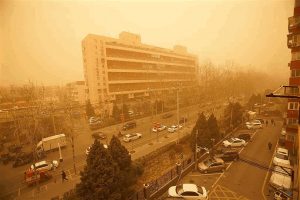Air Pressure

In the middle of March a sandstorm resulted in orange skies and incredibly unhealthy air quality measurements in Beijing. Sand had blown in from western desert areas in amounts far higher than usual, and this was at least partly due to large-scale deforestation. Meanwhile in the UK, legal limits on toxic air pollution have been broken for a decade, and over nine-tenths of the country (including a quarter of homes) is affected by pollution from roads, much of which consists of tiny particles from brakes, tyres and the burning of fossil fuels; this affects human health and also the wellbeing of wildlife.
These are specific examples of air pollution, discussed more fully in a report State of Global Air 2020 produced by the Health Effects Institute in Boston, US (see www.stateofglobalair.org). It states: ‘Air pollution was the 4th leading risk factor for early death worldwide in 2019, surpassed only by high blood pressure, tobacco use, and poor diet.’ Women who are exposed to particulate air pollution are more likely to have babies who are born premature or have low birth weight, both of which may lead to health problems for the children.
Over ninety percent of the world’s population experience concentrations of ambient fine particle air pollution (PM2.5) above the WHO Air Quality Guidelines, the highest being in India, Nepal and Niger. Rates are fairly low in North America and most of Europe, and levels have declined in some regions, but not in those which are most polluted. Ozone pollution, which can be caused by and contribute to climate change and mainly results from the burning of fossil fuels, has also been steadily increasing over the last decade, despite decreases in some places, such as China and Russia. It affects food crops as well as human health. Household air pollution results from burning fuels such as coal for heating or cooking; the extent of this has been much reduced, but half the world’s population remains exposed, primarily in the least-developed countries, and it particularly affects babies.
Long-term exposure to air pollution contributes to increased risk of illness and death from heart disease, lung cancer, stroke, and so on, with children and the elderly the worst affected. The estimate is that in 2019 it contributed to 6.67 million deaths, largely in Africa and Asia, including half a million deaths among infants who did not survive their first month. Compare the nine million or so who die each year from hunger and just under three million who die from obesity.
The coronavirus pandemic has resulted in cleaner and clearer skies in many locations, but it will take a lot more to restore clean air to as much of the planet as possible. Establishing a society that puts human well-being and the health of the planet first would be a major step in the right direction.
PB
